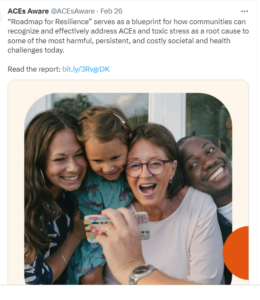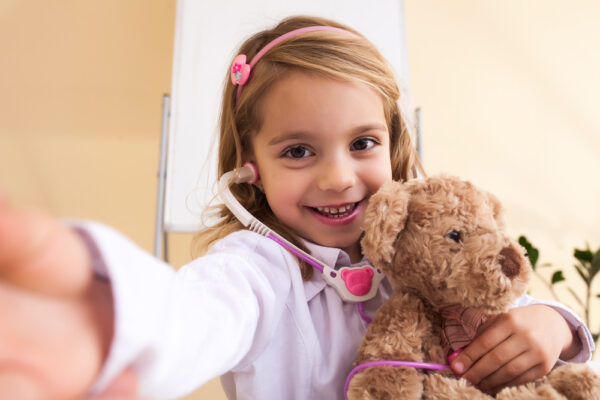
Could a team member dedicated to following up with young patients who screen positive for adverse childhood experiences, also known as ACEs, make a difference for vulnerable families? The pediatric healthcare team at Bay Area Community Health Center (BACH), which serves southern Alameda County and Santa Clara County residents, has shown it can.
A member of CCI’s Resilient Beginnings Network (RBN), this BACH team is devoted to providing trauma-informed care and resilience tools among its patients. But team members want to do more than simply identify vulnerable children who need interventions and assistance. They also want to support them by closing the loop through referrals and “warm handoffs” to specialist providers, including behavioral health practitioners. And with many patients’ families short on food, housing and other key resources, they want to make sure they have access to resources such as community-based organizations (CBOs) that can help them thrive.
But how to make that happen in busy pediatric clinic settings where staff are already stretched so thin? Enter a pilot program underway in BACH’s Alameda clinics where a pediatric care coordinator is tasked with this mission. The coordinator has made tremendous progress with high-needs patients, such as children with autism and others with complex, chronic, and challenging physical, developmental, and behavioral health concerns, says BACH pediatrician Sheshashree Seshadri.
The role has proven so successful at BACH that the organization’s pediatric care coordinator position has been extended beyond the pilot period. “It is crucial to sustain this position to help our patients from different ethnicities, immigrants, and refugees to get the adequate care they need and to help them navigate the system in the U.S.,” says Seshadri.
Shout out to BACH’s pediatric care coordinator, medical assistant Angelica Higuera, who is nothing short of “a blessing,” notes Seshadri, who works with Higuera out of the health center’s Fremont clinics in Alameda County. Seshadri, Higuera, and the rest of the trauma-informed care team coordinate closely to provide culturally sensitive and racially equitable care. Since each ACE can raise the risk of developing chronic disease and mental health difficulties during a person’s life, BACH addresses toxic stress and ACEs promptly and effectively and strives to dissolve silos between medical and behavioral health providers.
Seshadri explains how it plays out in practice: “We are working towards an Integrated pediatric behavioral health model where a pediatric patient sees a provider, is screened for ACEs, is then followed up by Angelica who talks with the behavioral healthcare coordinator, who then makes an appointment with a behavioral health provider. After the intake, the behavioral health provider sends an electronic medical records message to the provider about the session and other details.” Once that referral loop is complete, it can be closed between the pediatric care coordinator and behavioral health.
A care coordinator’s community outreach
The pandemic didn’t make this difficult work any easier. “COVID exacerbated the challenges our patients face,” says BACH’s RBN lead Seshadri. “Our patients need our support services now more than ever.”

Higuera’s position is funded by a Community Health Center Network pilot program, launched in January 2021, with support from Alameda County Behavioral Health Services, which gave grants to cover the cost of a pediatric care coordinator at eight federally qualified health centers in the East Bay. (The Community Health Center Network is one of CCI’s designated innovation hubs.)
One immediate challenge in the Fremont clinics was what Seshadri described as an onslaught of pediatric patients who were diagnosed with autism, many of whom were not able to get the help they needed during the peak of the pandemic.
“COVID babies are now three years old and parents notice that the [developmental delays] are not because they were isolated at home: other kids are reaching developmental milestones that their child is not,” explains Seshadri. “Their child should be starting preschool but they’re nowhere near ready. They realize their child needs further evaluation and interventions.”
That’s where the pediatric care coordinator has been invaluable, says Seshadri of Higuera, who she says has connected many patients in need to specialist medical staff and behavioral health practitioners.
Among them was Jigsaw Diagnostics, which provides autism diagnosis and evaluations conducted by a clinical psychologist. Other groups she reached out to included community-based organizations such as Alameda County Behavioral Health Care Services, Emerging Milestones in San Jose, which offers behavioral health interventions and education for patients on the autism spectrum and their families, and Kidscope Assessment Center for Developmental & Behavioral Health in Santa Clara County. (Patients without health insurance can get evaluated through Alameda Alliance’s mental health services.)
The patients BACH serves often have multiple social needs. For food and nutrition services, housing and rental assistance, other organizations within the community can offer consistent support to high-risk families.
For example, Seshadri recalls a food-insecure single mother who couldn’t read or write in any language and needed help feeding her child. She also needed assistance figuring out how to get her child to a specialist provider. Higuera got creative: She directed the parent to food distribution opportunities, including BACH’s own Food Farmacy program, a prescription that provides access to education and nutrient-rich food to families in need. And she printed photos with images of major landmarks to help the mom find the location of the physician. The approach worked.
All these labor intensive and often uniquely patient-specific details are managed via BACH’s electronic health record, Epic. That’s also where pediatricians can send referrals to the pediatric care coordinator. Epic stores information such as how many referrals have been made, how many are open, and how many are closed, so the entire team is aware of the status of a patient’s case and things don’t fall through the cracks. While they work as a team to close the loop, it’s crucial to have someone with dedicated time to reach out to make community connections and establish relationships, say the team members.
In Alameda, all the clinics are close together, maybe a five-to-ten minute drive apart, which makes it relatively easy for pediatric patient coordinator Higuera to move between clinics. The goal here is to offer follow up and also to provide more holistic care to patients.
“I do a lot of research, I go online, I try to get referrals from parents that already have experience accessing some of the resources I’m trying to find for other patients,” explains Higuera, who speaks Spanish and English. There’s a medical assistant on staff who speaks Farsi and other Afghan languages, including Dari and Pashto. “I call organizations on behalf of patients to see if it’s a good fit, and then I provide those numbers to the patients. That’s how I do it. I wish I could help everybody, but I feel sometimes it’s just out of my hands.”
“I wish I could do more,” Higuera adds.
Her role, it’s clear, extends beyond following up on medical and behavioral health referrals. “I think the challenge right now, almost every single parent will say it’s about food insecurity or housing insecurity,” she says. “And it’s not because they don’t have a job, it’s just that it’s not enough, what they’re making for the family. It feels good when you connect parents to services the family needs, they get the help they need, and they thank you for the connection. But sometimes you also take the work home with you in your head, worrying about something you didn’t finish that day or what happened to a particular patient.”
On any given day, Higuera might be assisting anywhere from 12 to 24 patients. Not only does Seshadri hope that the pediatric care coordinator position becomes a permanent part of the RBN team, she says the need is so great it is more than a one-person job. The role requires compassion, empathy, determination, perseverance, and patience. It also requires someone who is a meticulous multi-tasker, she says, while also being personable and able to build trust with children and their parents as well as community organizations.
An integrated approach to childhood trauma
The pandemic is a major part of BACH’s evolution. In 2020, Bay Area Community Health Center was founded with the merger of southern Alameda County’s Tri-City Health Center and Santa Clara County’s Foothill Community Health Center. Created during the middle of the COVID-19 crisis, BACH brings more than 70 years of combined service to an area that stretches from Hayward to Gilroy in Northern California.
Today, through more than 34 clinics, BACH serves more than 100,000 people, regardless of their immigration status, ethnicity, disabilities, or ability to pay. BACH consists of several Fremont-based clinics, which provide physical, behavioral, dental, vision, acupuncture, and chiropractic care. It also includes five San Jose clinics, a Gilroy clinic, five San Jose school clinics and a Gilroy school clinic, in addition to mobile health services for school students, seniors, and other residents requiring health care.

BACH employs a multi-pronged approach to address ACEs and toxic stress. As with other clinics in the Resilient Beginnings Network cohort, the center is working to bolster its trauma-informed care at its pediatric clinics in Fremont and Santa Clara. All pediatric staff have received training on ACEs screening through the ACEs Aware program. Screening for ACEs and social needs in pediatric clinical settings serves as an entry point to promote early intervention for childhood trauma.
This is important because children who experience such trauma can suffer from toxic levels of stress, which, if not addressed, can undermine physical and mental health and development beginning in infancy and continuing into adulthood.
To create a bridge to patients, the team has explored a healing strategy, known as the TRIADS framework, which is based on trust, empathy, dignity, and mutual respect in its ACEs screenings and follow-up. This framework (an acronym that stands for Trauma and Resilience-Informed Inquiry for Adversity, Distress and Strengths) urges providers to explore their patients’ experiences with racism, discrimination, and maltreatment as well as their sources of resilience. That’s vital because patients with such histories often experience healthcare and other systems as impersonal, judgmental, and harmful. Since building strong relationships between providers, patients, and families is key to promote healing, “we end the visit with positive affirmations talking about the support and strengths the family has,” Seshadri says.
There is certainly great need for such support. Of the 5,531 patients the staff initially screened, more than 50 percent had at least one positive ACEs and five percent tested positive for four or more ACEs. It’s important to address ACEs early because the toxic stress from childhood trauma, left unchecked, can substantially raise the risk of developing cancer, heart disease, and other life-threatening conditions later in life. Having four or more ACEs is also associated with a 12 times higher prevalence of mental health challenges such as alcoholism, substance use disorders, depression, and suicide attempts, as compared with people who do not have this risk factor.
BACH is intent on screening every patient from newborns to 18 for ACEs via the widely used assessment tool known as PEARLS, which stands for Pediatric Adverse Childhood Experiences (ACEs) and Related Life Events Screener. The BACH screening is available in multiple languages, including Spanish, Vietnamese, Mandarin, Cantonese, Dari and Pashto.
In addition, the Fremont clinics are working on establishing what’s known as a “No Hit Zone,” which serves to create a safe, violence-free environment where no child is hit by an adult or another child, and no adult hits a child or another adult. The clinics feature posters promoting the campaign, which also seeks to educate adults about effective parenting techniques and put an end to child abuse and corporal punishment, including spanking.

Showing ‘A Place to Breathe,’ a film about immigrants and cultural sensitivity in health care, was inspirational to the staff.
As part of their collaboration with RBN, the staff also watched “A Place to Breathe,” an independent film that documents refugee trauma and resilience around the country, through the experience of health care practitioners and patients. The film highlights the power of local health clinics that partner with community groups to help refugees and immigrants heal from trauma. “As an immigrant, female, Indian physician, the film resonated with me as it highlights the creative strategies by which immigrant communities in the U.S. are resilient and thrive,” notes Seshadri.
Screening for ACEs can be difficult for staff and providers, especially those that have experienced their own trauma. Health centers have learned that providing trauma-informed care means they also must create a supportive environment for staff. This includes space for reflection, team debriefs, and team leaders communicating about and providing access to resources, as needed. “We administered ACEs screening for staff in two of our clinics in the north and south and were able to identify ACEs and provide support to these staff members, says Seshadri.
Alleviating ACEs is not just the compassionate thing to do. It’s the right thing to do economically, as the BACH team notes. In the state of California alone, ACEs-linked health-related costs total around $112.5 billion annually, according to a 2020 study. Researchers also found that 16% of people have four or more ACEs and account for 36% of total ACEs-related healthcare costs.
Seshadri is hopeful that BACH can hire more pediatric behavioral health providers to share the load. And she says the health center is in discussions with grantmakers about funding a second pediatric care coordinator position dedicated to serving their patients in Santa Clara County, where there is also a need for such services.
Lessons Learned
Support ongoing education. There is a continual need for training around ACEs and trauma-informed care for all staff, including when onboarding new employees, in order to address patient needs from a trauma-informed and resilience perspective.
Make diverse hires a priority. BACH is making a point to emphasize hiring bilingual staff with cultural sensitivity training at all levels. That’s critical for a health center that has more than 70 different languages spoken in the clinics in the two counties it serves.
Expand external resources. It’s also an on-going process to strengthen a health center’s external referrals and CBO network to include a wide array of services that can help patients.
Schedule time for RBN work. Designated time for resilience and trauma-informed care work makes a huge difference towards making progress on team goals. Trying to squeeze this work in during lunch breaks, after clinic hours, or on weekends isn’t giving it the due it deserves.
Create a record of referrals for tracking and data gathering purposes. It’s important to quantify the volume of work that the pediatric care coordinator (PCC) is doing to help evaluate the program and its effectiveness and efficiency. Make it simple: the PCC is tasked with a lot of referrals and follow up for patients. Factor this outreach into the health center’s electronic health records. The IT department can help streamline this process, including providing “smart touch” forms that can calculate the amount of time a PCC spends with a patient. These notes help to keep all team members up to speed and measuring success is also critical in terms of securing funding and grants for these positions.
_____________________________________
The Bay Area Community Health Center is part of the Resilient Beginnings Network, a learning program that promotes trauma- and resilience-informed care so that 100,000 young children and their caregivers in the San Francisco Bay Area have the support they need to be well and thrive. The Resilient Beginnings Network is powered by the Center for Care Innovations, an Oakland-based nonprofit that fosters health equity and innovation in the health care safety net, and by Genentech Charitable Giving.
Find this useful or interesting? We’re constantly sharing stuff like this. Sign up to receive our newsletter to stay in the loop.

